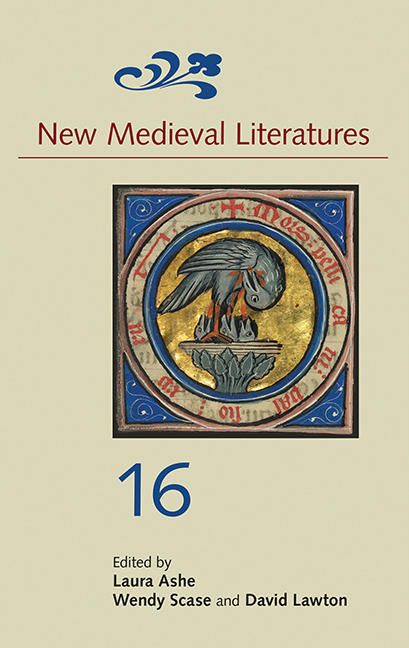Book contents
- Frontmatter
- Contents
- 1 The Book of the World at an Anglo- Norman Court: The Bestiaire de Philippe de Thaon as a Theological Performance
- 2 Monks, Money, and the End of Old English
- 3 Sustainability Romance: Havelok the Dane's Political Ecology
- 4 Locating the Border: Britain and the Welsh Marches in Fouke le Fitz Waryn
- 5 From disputatio to predicatio – and back again: Dialectic, Authority and Epistemology between the Roman de la Rose and the Pèlerinage de Vie Humaine
- 6 Mixed Feelings in the Middle English Charlemagne Romances: Emotional Reconfiguration and the Failures of Crusading Practices in the Otuel Texts
- 7 Circularity and Linearity: The Idea of the Lyric and the Idea of the Book in the Cent Ballades of Jean le Seneschal
- 8 ‘What shal I calle thee? What is thy name?’: Thomas Hoccleve and the Making of ‘Chaucer’
1 - The Book of the World at an Anglo- Norman Court: The Bestiaire de Philippe de Thaon as a Theological Performance
Published online by Cambridge University Press: 05 July 2016
- Frontmatter
- Contents
- 1 The Book of the World at an Anglo- Norman Court: The Bestiaire de Philippe de Thaon as a Theological Performance
- 2 Monks, Money, and the End of Old English
- 3 Sustainability Romance: Havelok the Dane's Political Ecology
- 4 Locating the Border: Britain and the Welsh Marches in Fouke le Fitz Waryn
- 5 From disputatio to predicatio – and back again: Dialectic, Authority and Epistemology between the Roman de la Rose and the Pèlerinage de Vie Humaine
- 6 Mixed Feelings in the Middle English Charlemagne Romances: Emotional Reconfiguration and the Failures of Crusading Practices in the Otuel Texts
- 7 Circularity and Linearity: The Idea of the Lyric and the Idea of the Book in the Cent Ballades of Jean le Seneschal
- 8 ‘What shal I calle thee? What is thy name?’: Thomas Hoccleve and the Making of ‘Chaucer’
Summary
Introduction
Bestiaries, which describe the natures of animals, birds, and stones and derive allegorical meanings from them, occupy a curious position in relation to medieval theology. The content of these books, almost always illuminated, often lavishly so, saw an explosion in popularity in the twelfth and thirteenth centuries, particularly, but not exclusively, in Northern Europe. Up to that point bestiaries had circulated widely in clerical circles, but lay audiences increasingly sought the improving pleasure that came from learning about the wondrous creatures of the world and the spiritual messages inscribed in their behaviour by God. Increasingly translated into the vernacular, bestiaries became hybrid and mediational texts, situated between clerical and lay spheres, between theology and natural history, and between the school and the court. The diversity of their uses can be seen in the variation in form, language, and manuscript context and makes it difficult to confine them to any one modern disciplinary category. Such variety, moreover, makes it hard to offer generalizations about their content, meaning, and purpose. This article arises out of a desire to explore the relationship between bestiaries and medieval theology, particularly the question of how the allegories of beasts (seeing in the unicorn a sign of Christ or in the hedgehog a sign of the devil) were informed by ideas of a signifying natural world found amongst authoritative theologians. Bestiaries, in which creatures are sometimes read allegorically, sometimes read for moral messages, and sometimes simply described literally or proto- zoologically, can partly be explained by the fact that they imply an understanding of a created world that signifies in a similar way to the book of Scripture. The Bible describes events according to different modes of signification: the historical (the literal account of what happened), the allegorical (when what is described signifies another event in the past, present, or future), and the tropological (when what is described offers moral lessons). Even if the surface appearance, the literal sense, may seem confusing or disjointed, the exegete who has, over time, acquired knowledge of the hidden senses will begin to discover a hidden unity and coherence to the Bible.
- Type
- Chapter
- Information
- New Medieval Literatures , pp. 1 - 38Publisher: Boydell & BrewerPrint publication year: 2016



